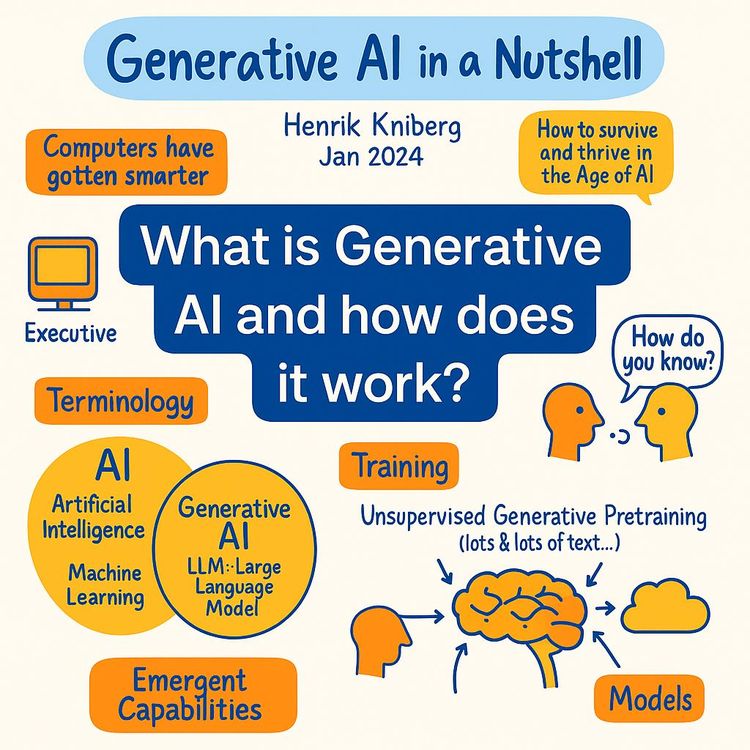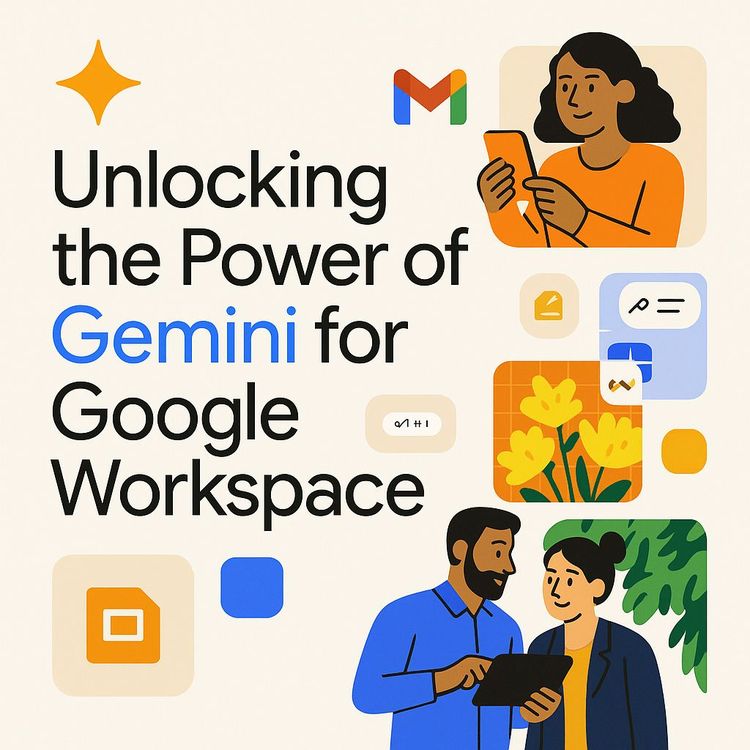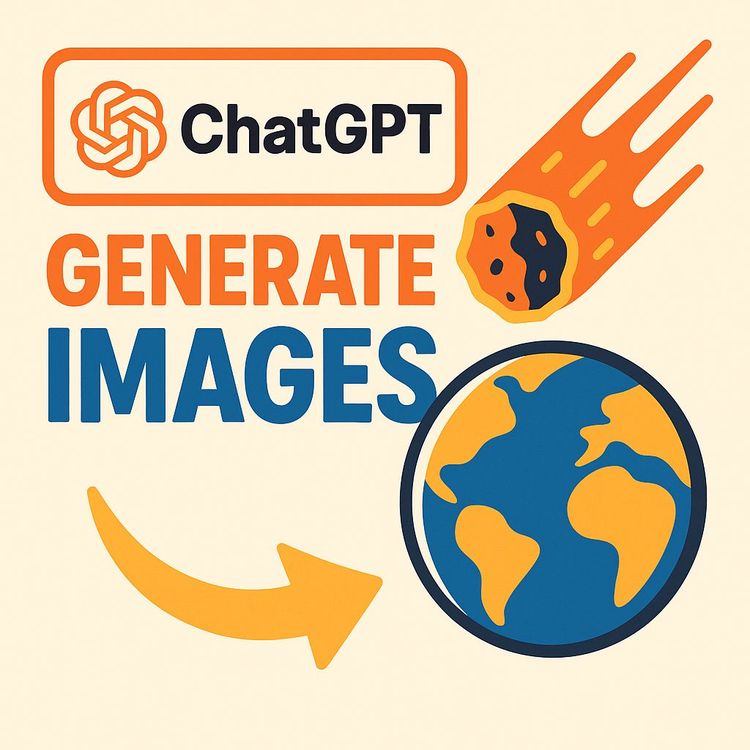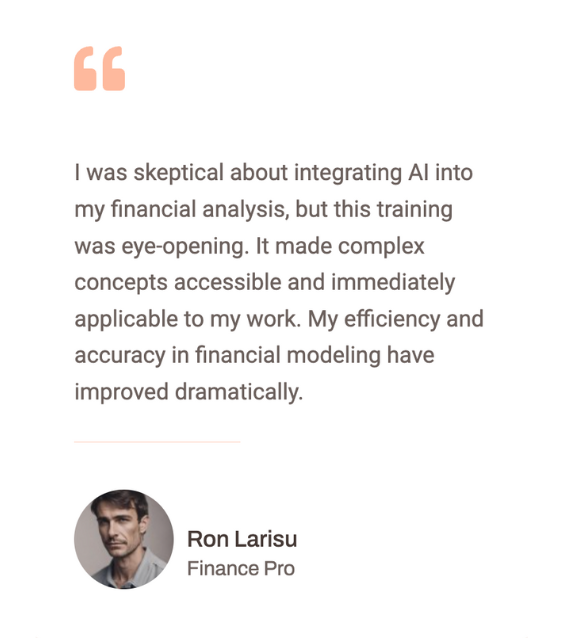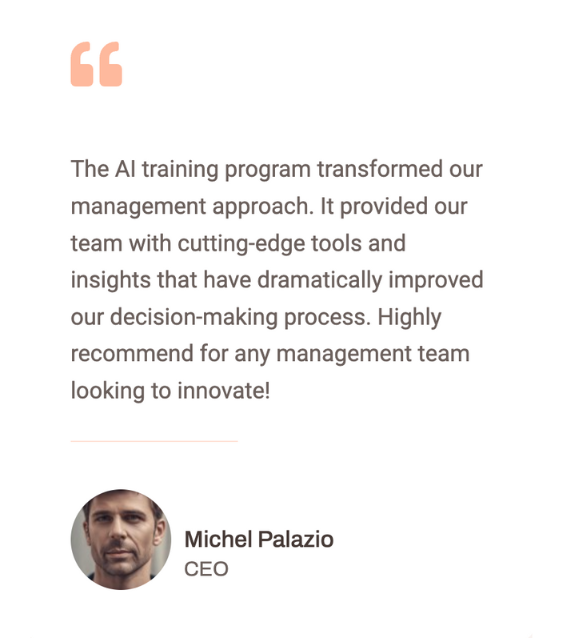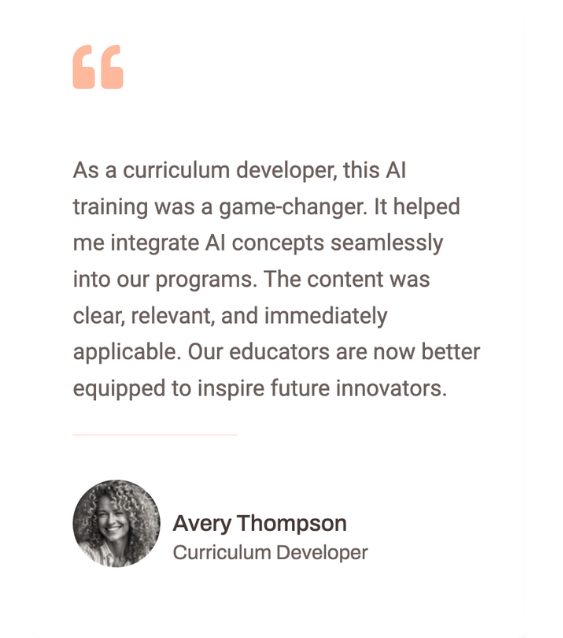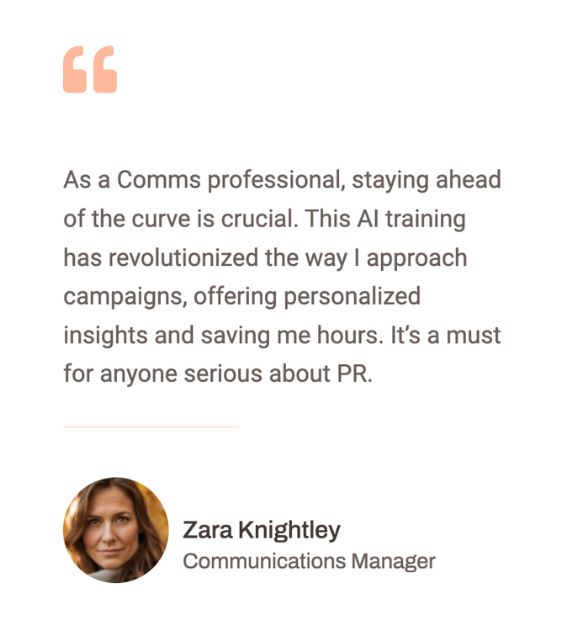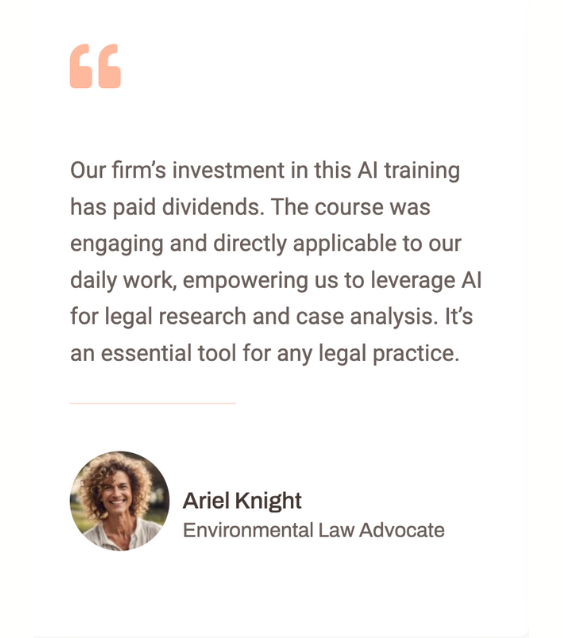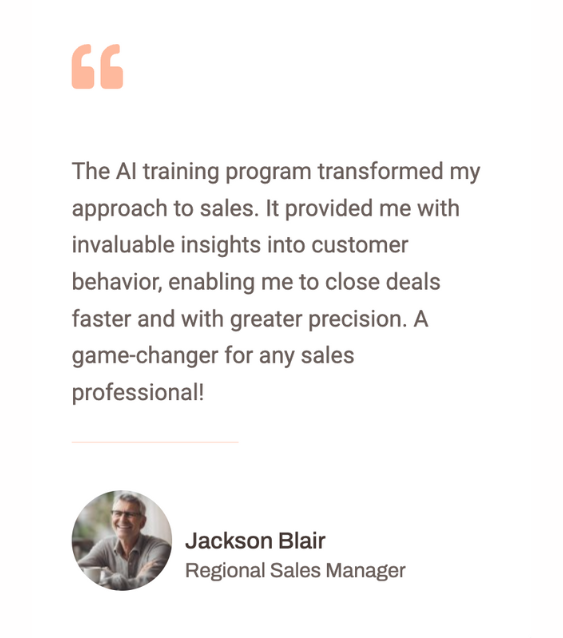Video Course: Using AI in Sales and Marketing
Discover how AI can transform sales and marketing with practical insights to enhance efficiency and effectiveness. This course offers a deep dive into AI applications, helping you streamline tasks, personalize communication, and focus on strategic growth.
Related Certification: Certification: AI-Powered Sales and Marketing Strategies for Professionals
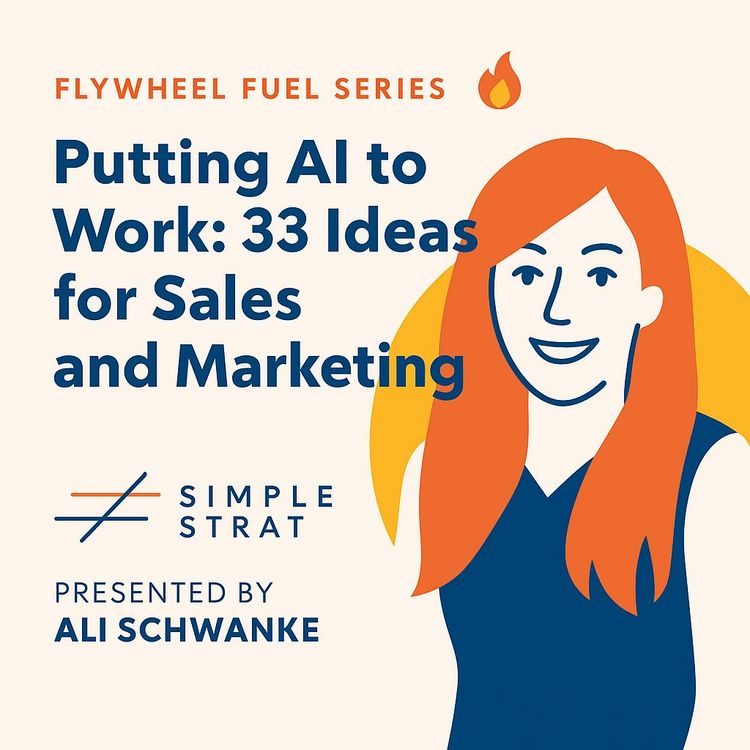
Also includes Access to All:
What You Will Learn
- Identify high-impact AI use cases for sales and marketing
- Map processes and define what "good" looks like
- Use AI for smarter prospecting, CRM automation, and meeting summaries
- Create AI-assisted content outlines and repurpose video assets
- Plan, pilot, document, and train teams on AI integrations
Study Guide
Introduction: Embracing AI in Sales and Marketing
Welcome to the transformative journey of integrating Artificial Intelligence (AI) into sales and marketing strategies. This course, "Video Course: Using AI in Sales and Marketing," is designed to equip you with a comprehensive understanding of how AI can revolutionize your approach to these critical business functions. By the end of this course, you'll not only grasp the theoretical underpinnings of AI in sales and marketing but also gain practical insights into its applications, ultimately enhancing efficiency and effectiveness in your operations.
Why is this valuable? In an era where customer expectations are evolving rapidly and the pressure to deliver results is ever-increasing, AI offers a strategic advantage. It automates mundane tasks, enhances customer understanding, personalizes communication, and liberates professionals to focus on relationship-building and strategic decision-making. Let's dive into the core components of AI in sales and marketing, starting from the basics and advancing to more sophisticated applications.
The Current Landscape and Challenges
AI's integration into sales and marketing has stirred a mix of excitement and anxiety. Some fear job displacement, while others are thrilled by the potential efficiencies AI offers. The primary challenge lies in understanding what customers truly want, often beyond what they explicitly express. AI can help "read sentiment" and "read between the lines," offering insights into customer desires that aren't immediately apparent.
Example 1: A company might use sentiment analysis tools to interpret customer feedback on social media, uncovering hidden dissatisfaction that isn't overtly stated.
Example 2: AI can analyze email interactions to detect subtle changes in tone or engagement, signaling shifts in customer interest or satisfaction.
Sales professionals often face increased workloads with unchanged quotas, making AI tools appealing for efficiency gains. Similarly, marketers are pressured to "do more with less," necessitating careful management of AI resources.
Example 1: AI-driven CRM systems can automate data entry, freeing sales reps to focus on closing deals.
Example 2: Automated content generation tools can help marketers create diverse content ideas, reducing the time spent on brainstorming.
There's also a growing concern about the authenticity of interactions, as individuals question whether they're engaging with humans or AI. This highlights the importance of genuine relationship-building in an AI-enhanced environment.
Example 1: Personalized email campaigns that leverage AI for segmentation but maintain a human tone can bridge this gap.
Example 2: AI can assist in creating personalized video messages that retain a human touch while benefiting from AI's efficiency.
Strategic Adoption of AI
Jumping into AI without a plan can lead to inefficiencies. The mantra here is "plan first, then experiment." Understanding what "good looks like" in your processes is crucial before implementing AI. AI is not a cure-all for flawed strategies; it requires guidance and management.
Example 1: Before using AI for content creation, define what constitutes a successful blog post, ensuring AI-generated content aligns with these standards.
Example 2: In sales, establish clear criteria for lead qualification before employing AI tools for prospecting.
AI tools should be viewed as an "intern" rather than a fully autonomous replacement. They require oversight and direction to be effective.
Example 1: Use AI tools like ChatSpot for prospecting but involve human oversight to refine and validate the AI's suggestions.
Example 2: Employ AI for initial drafts of marketing emails, but rely on human editors to ensure the content resonates with the target audience.
The focus in B2B content has shifted from quantity to quality, emphasizing context, insights, and decision-making assistance. Using AI to generate more of the same old content won't cut it.
Example 1: AI can analyze industry trends and provide insights that inform strategic content creation.
Example 2: Instead of churning out generic articles, use AI to tailor content based on specific audience segments, enhancing relevance and engagement.
Five Key Areas for AI Application
Sales Efficiency
AI enhances sales efficiency through smarter prospecting, CRM data entry automation, and sales meeting preparation.
Example 1: AI tools can analyze customer data to identify high-potential prospects, enabling sales teams to focus their efforts on the most promising leads.
Example 2: Automated meeting preparation tools can provide sales reps with relevant insights and talking points, improving meeting outcomes.
AI also assists in adjusting message tone, improving subject lines, and summarizing industry articles.
Example 1: AI-driven email assistants can suggest tone adjustments to align with recipient preferences, increasing the likelihood of engagement.
Example 2: Tools that generate concise summaries of industry articles can keep sales teams informed about market trends without consuming excessive time.
Marketing
AI revolutionizes marketing by generating diverse content ideas, creating content outlines, and drafting email and social media copy.
Example 1: AI tools can analyze competitor content to identify gaps and opportunities for differentiation, inspiring fresh content ideas.
Example 2: Automated content outline generators can streamline the planning phase, enabling marketers to focus on content quality.
AI can also summarize YouTube videos and assist in competitor research.
Example 1: AI-driven video summarization tools can extract key points from lengthy videos, aiding in quicker research and decision-making.
Example 2: Competitor analysis tools can identify trends and strategies, informing your marketing approach and positioning.
Sales Communication
AI enhances email writing through grading tools, summarization, and personalization based on personality and context.
Example 1: Email grading tools like Lavender AI evaluate email effectiveness, offering suggestions for improvement and optimizing for mobile viewing.
Example 2: AI tools can personalize communication by analyzing recipient personality traits, ensuring messages resonate with individual preferences.
Research
AI streamlines sales and marketing research, including industry trends, competitor analysis, and understanding target audiences.
Example 1: AI-driven trend analysis tools can identify emerging market shifts, enabling proactive strategy adjustments.
Example 2: Competitor analysis tools provide insights into competitor activities, helping you refine your positioning and messaging.
Meeting/Personal Productivity Operations
AI automates meeting notes and action items, creates calendar invites from text, and prioritizes tasks.
Example 1: Meeting transcription tools like Fireflies.ai can summarize discussions and highlight action points, ensuring follow-through and accountability.
Example 2: AI-powered calendar management tools like Reclaim.ai optimize scheduling, ensuring time is allocated for important tasks and habits.
Specific AI Tools and Use Cases Demonstrated
Several AI tools offer immediate benefits for sales and marketing improvement.
ChatSpot (HubSpot): Used for smarter prospecting and CRM integration.
Lavender AI: Grades email effectiveness and offers writing suggestions.
Crystal Knows: Provides personality insights for tailored communication.
Fireflies.ai: Records and summarizes meetings.
Big Room.tv: Repurposes video content into vertical formats.
Notion AI: Assists with process documentation.
Sanebox: Manages and cleans email inboxes.
Apollo.io: Automates outreach based on triggers.
VidIQ: Assists with YouTube content strategy.
Reclaim.ai: Manages calendar for productivity.
Split Long Text (Chrome Extension): Breaks down large texts for easier processing.
Importance of Preparation and Training Data
For AI tools to be effective, understanding your target audience, their pain points, and desired outcomes is crucial. Creating a "recipe" document with this information is recommended.
Example 1: A well-defined customer persona document can guide AI in personalizing marketing messages effectively.
Example 2: Training AI models with your brand voice ensures generated content aligns with your identity and resonates with your audience.
Next Steps Recommended by the Course
To integrate AI effectively, map out your existing sales and marketing processes and identify areas for AI implementation. Choose one or two use cases, pilot the chosen tools, and document the process for team training.
Example 1: Start with a pilot project using AI for lead qualification, measuring its impact on conversion rates.
Example 2: Document the AI integration process in a shared platform like Notion, ensuring team members have access to guidelines and best practices.
Conclusion: Harnessing AI for Sales and Marketing Success
By now, you should have a comprehensive understanding of how AI can be strategically integrated into sales and marketing workflows. The course emphasizes the importance of planning, understanding fundamental processes, and viewing AI as a supportive tool rather than a complete replacement for human expertise. Through specific use cases and AI-powered tools, you've gained actionable steps to enhance efficiency, improve customer engagement, and drive better results. Remember, the thoughtful application of these skills is key to maximizing the benefits of AI, ensuring it complements your efforts in building genuine relationships and achieving business success.
Podcast
There'll soon be a podcast available for this course.
Frequently Asked Questions
Frequently Asked Questions: Leveraging AI in Sales and Marketing
Welcome to the FAQ section for the 'Video Course: Using AI in Sales and Marketing'. This resource is designed to help you navigate the complexities of integrating AI into your sales and marketing efforts. Whether you're just starting or looking to deepen your understanding, these FAQs cover a range of topics from beginner to advanced, ensuring you have the insights needed to effectively leverage AI in your business strategies.
Why is there so much discussion and varied reaction to the integration of AI in sales and marketing teams?
The integration of AI in sales and marketing has sparked a range of emotions and discussions primarily due to uncertainty about its impact on jobs and the changing dynamics of customer engagement. Some fear job displacement, while others are excited about potential efficiencies. A key challenge is understanding evolving customer needs, and AI offers tools to analyse sentiment and behaviour to address this. Furthermore, the pressure to achieve results with potentially outdated strategies is leading many to explore AI as a solution, although it's crucial to recognise that AI is not a silver bullet and requires strategic implementation. The fear of interacting with non-human entities is also a growing concern, highlighting the continued importance of genuine relationship building.
What are the key challenges preventing businesses from effectively using AI in their sales and marketing efforts right now?
Several factors hinder the effective use of AI. A primary challenge is a lack of clarity on where to begin, given the abundance of available tools and the associated "fear of missing out" (FOMO) that can lead to haphazard adoption without a strategic plan. Many businesses jump into using AI without first defining what "good" looks like in their existing processes, leading to inefficient implementation and potentially chaotic results. There's also a misconception that AI can autonomously handle tasks like content creation, rather than acting as a managed assistant or "intern". Finally, some organisations are simply using AI to amplify old, less effective strategies instead of adapting their approach to leverage AI's unique capabilities.
In what key areas can AI be practically applied to improve sales efficiency?
AI offers numerous practical applications for boosting sales efficiency. These include understanding buyer sentiment and intent through communication analysis, enabling smarter prospecting by identifying relevant companies and contacts based on various criteria (e.g., technology usage, industry), and automating CRM data entry. AI can also significantly aid in preparing for sales meetings by providing insights and relevant information, adjusting the tone of sales messages for better reception, generating effective subject lines for emails, and summarising industry articles for quick understanding of trends. Furthermore, AI can assist in creating sales decks, grading the effectiveness of emails, summarising email content, writing personalised outbound emails, optimising emails for mobile viewing, and even automating outreach based on specific triggers.
How can AI transform marketing activities and help marketers escape "boringville"?
AI can revolutionise marketing by generating fresh and engaging content ideas, helping marketers break away from repetitive themes. It can assist in creating content outlines, drafting email copy for campaigns and newsletters (especially for recurring formats like webinar announcements), and drafting social media posts (though these often require human editing for authenticity). AI tools can summarise YouTube videos for research or description generation, aid in competitor research to understand their strategies and keyword targeting, and help identify podcast or channel collaboration opportunities. Additionally, AI can be used to repurpose video content into shorter clips for social media, offer text-based editing tools for video interviews, and ultimately free up marketers to focus on more strategic and creative tasks.
What are some specific AI-powered tools and features mentioned that can be used immediately for sales and marketing improvement?
Several tools and features were highlighted for immediate use. ChatSpot.ai (HubSpot's AI assistant) can be used for smarter prospecting, CRM integration, company research, and generating marketing content ideas. Lavender AI is valuable for grading and improving email effectiveness, offering writing suggestions, and optimising emails for mobile. Crystal Knows provides personality insights to tailor communication. Fireflies.ai can record and summarise meetings. Big Room.tv can repurpose video content into vertical formats. Notion allows for AI-assisted process documentation. Sanebox helps manage and clean email inboxes. Apollo.io offers AI-powered play templates for automated outreach based on triggers. VidIQ assists with YouTube content strategy and title generation. Finally, Reclaim.ai helps schedule time for important, non-urgent tasks and manage your calendar effectively.
What is the importance of having well-defined processes and understanding "what good looks like" before implementing AI tools?
Before integrating AI, it's crucial to have clearly defined sales and marketing processes and a solid understanding of what constitutes successful outcomes. AI is most effective when applied to well-established workflows, acting as an efficiency enhancer rather than a replacement for foundational knowledge. If you don't know what a good blog post, email, or sales meeting looks like, AI will simply automate potentially flawed practices, leading to increased inefficiency and potentially chaotic results (like a poorly executed renovation). Understanding your objectives and standards allows you to guide and evaluate AI's output effectively, ensuring it contributes to meaningful improvements.
How can businesses address the concern that AI-generated communication might lack genuine human connection?
While AI can automate and personalise communication to a degree, maintaining genuine human connection requires a strategic approach. The key is to use AI to handle routine tasks and research, freeing up sales and marketing professionals to focus on building and nurturing authentic relationships. AI can provide insights to make interactions more relevant, but the actual communication should strive for transparency and avoid deceptive "fake personalisation". The human touch remains essential for building trust and long-term customer loyalty. AI should be seen as a tool to enable more meaningful human interaction, not replace it entirely.
What are the recommended next steps for businesses looking to integrate AI into their sales and marketing strategies?
The initial steps involve a structured approach. First, businesses should map out their current sales and marketing processes to identify areas where AI could have the most significant impact. Next, they should identify specific use cases based on their needs and the AI applications discussed. It's advisable to start with a single pilot project to test the effectiveness of a chosen AI tool or feature. Once a successful pilot is implemented, it's crucial to document the process and provide training to the team to ensure consistent and effective usage. Finally, businesses should recognise that this is an ongoing process of learning and adaptation, and continuous evaluation is necessary to maximise the benefits of AI integration.
What is a primary goal when using AI in sales and marketing?
The primary goal of using AI in sales and marketing is to become more human by offloading mundane and routine research tasks. This allows sales and marketing professionals to focus on building genuine relationships, which are essential for accelerating results.
What concern is highlighted regarding the increasing use of AI in communication, and what impact might this have on email engagement?
There's a growing concern that people can't always tell if they are communicating with a human or an AI, leading to a reluctance to open emails. This healthy fear of automated interactions necessitates a greater emphasis on real relationship building, which AI tools should ideally support.
Before implementing AI tools, what crucial step is necessary for achieving efficiency?
Before implementing AI tools, it's crucial to understand what "good" looks like in your sales and marketing processes. Without a clear understanding of effective strategies and quality output, simply applying AI can introduce chaos and inefficiency, mirroring a bad remodel job.
What are the four categories identified for understanding buyers better with the help of AI?
The four categories for understanding buyers better with AI are: understanding what buyers say, understanding what buyers are thinking, understanding how buyers are feeling (sentiment), and understanding how buyers are going to act (predictive analytics).
Name two ways AI can assist in making sales prospecting more effective.
Two ways AI can enhance sales prospecting are by enabling smarter targeting through identifying relevant technologies or company characteristics and by streamlining the process of adding prospect information directly to a CRM, eliminating manual data entry.
How can AI tools like Lavender assist in improving sales communication beyond just writing emails?
AI tools like Lavender can grade the effectiveness of emails based on factors such as readability, length, and tone, providing insights into how to write better emails overall. Additionally, they can offer mobile-optimised previews and highlight areas for improvement in clarity and conciseness.
Describe how to use AI to overcome the "blinking cursor" issue when creating marketing content.
To overcome the "blinking cursor" issue, AI tools can generate content outlines based on a given topic, target audience, and desired outcome. This provides a structured starting point, freeing up human creativity for developing the actual content.
What is the key difference between AI content assistance within HubSpot and a dedicated tool like Lavender for email writing?
HubSpot's AI content assistance offers a more structured and perhaps less flexible approach to email writing, aiming to prevent errors and ensure basic quality. In contrast, Lavender provides more in-depth analysis and grading of emails, offering detailed feedback on various aspects of writing quality and effectiveness.
Give an example of how AI can be used to improve personal productivity and time management.
AI can improve personal productivity by automatically summarizing meeting notes and creating action items and recaps through tools like Fireflies.ai. Additionally, tools like Reclaim.ai can intelligently schedule time for important but not urgent tasks, helping individuals prioritise and manage their workload effectively.
What is a crucial non-AI related step that businesses should take to maximise the benefits of AI tools in sales and marketing?
The importance of mapping out existing sales and marketing processes before implementing AI tools cannot be overstated. Understanding current workflows and identifying areas where time is being inefficiently spent is essential for strategically applying AI to achieve meaningful improvements.
What are the potential benefits and challenges of integrating AI tools into existing sales and marketing workflows?
Integrating AI tools can lead to significant benefits such as increased efficiency, improved customer insights, and enhanced decision-making. However, challenges include the need for clear strategy, potential resistance to change, and the risk of over-reliance on AI without human oversight. Successful integration requires balancing AI capabilities with human intuition and creativity.
Why is maintaining a human-centric approach important while leveraging AI in sales and marketing?
Maintaining a human-centric approach ensures that AI enhances rather than replaces human interactions. AI can handle routine tasks, allowing professionals to focus on building genuine relationships. This balance is crucial for trust and loyalty, as customers value authentic connections. AI should empower humans to be more effective, not diminish the personal touch.
How does AI enhance efficiency across various aspects of the sales process?
AI enhances sales efficiency by automating data entry, analysing communication patterns, and providing predictive insights for prospecting. It streamlines meeting preparations and follow-ups through summarisation and action item generation. AI also optimises communication by suggesting tone adjustments and content improvements, ensuring more effective engagement.
How can AI help sales and marketing professionals be "more human"?
AI helps professionals be "more human" by taking over repetitive tasks, freeing up time for meaningful interactions. For example, AI can automate data analysis and reporting, allowing professionals to focus on creative problem-solving and relationship building. This shift enables them to deliver personalised experiences that resonate with customers on a deeper level.
What is a strategic approach for piloting and implementing AI tools within sales and marketing departments?
A strategic approach involves identifying specific areas where AI can add value, starting with a pilot project to test effectiveness. Businesses should document processes and outcomes, provide comprehensive training, and gather feedback for continuous improvement. It's essential to align AI initiatives with business goals and ensure ongoing evaluation to adapt strategies as needed.
Certification
About the Certification
Show the world you have AI skills—master advanced sales and marketing strategies powered by artificial intelligence. Stay ahead in your field and enhance your professional profile with expertise that today’s top organizations value.
Official Certification
Upon successful completion of the "Certification: AI-Powered Sales and Marketing Strategies for Professionals", you will receive a verifiable digital certificate. This certificate demonstrates your expertise in the subject matter covered in this course.
Benefits of Certification
- Enhance your professional credibility and stand out in the job market.
- Validate your skills and knowledge in cutting-edge AI technologies.
- Unlock new career opportunities in the rapidly growing AI field.
- Share your achievement on your resume, LinkedIn, and other professional platforms.
How to complete your certification successfully?
To earn your certification, you’ll need to complete all video lessons, study the guide carefully, and review the FAQ. After that, you’ll be prepared to pass the certification requirements.
Join 20,000+ Professionals, Using AI to transform their Careers
Join professionals who didn’t just adapt, they thrived. You can too, with AI training designed for your job.

